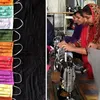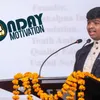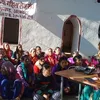From enabling the visually impaired to recycling e-waste – the top Social Stories of the week
This week, SocialStory covered stories of empowerment, sustainability, and restoration of livelihoods that have been helping the underserved and the disabled communities.
On October 14, SocialStory celebrated International E-waste Day, on account of which we identified some of the startups that have been recycling e-waste effectively.
Talking about sustainability, we also presented the story of a Rs 22 crore initiative called ‘Powering Livelihoods’ that is empowering clean-energy based livelihoods.
Similar to the above initiative, non-profit Jagriti is also helping restore livelihoods in middle-income regions such as Purvanchal in Uttar Pradesh.
Here are the week’s top Social Stories:
A Rs 22 Cr initiative that empowers clean energy-based livelihood solutions in India

Making fabrics with the 'Solar Charkha'
‘Powering Livelihoods’ is a Rs 22 crore initiative that was co-initiated by Council on Energy, Environment and Water (CEEW), and Villgro Innovations Foundation. Its goal is to boost India’s rural economy by supporting Indian enterprises working on clean energy-based livelihood solutions.
The two organisations came together with the common goal envisioning clean energy playing a major role in the empowerment of rural livelihoods. The funding will help the social enterprises working for the cause to obtain the required funding for the deployment of their solutions.
How these companies are helping India recycle electronic waste

Representational image (Source: Pexels)
India produces over two million tonnes of e-waste every year, and also imports large quantities of it from other geographies around the globe.
Moreover, when e-waste, which includes many toxic elements, is dumped on landfills, it increases the chances of e-waste polluting the surrounding air and water. Hence, the scientific management of e-waste is imperative.
On the occasion of International E-waste Day, SocialStory listed several startups and companies that are helping India’s informal sector collect, process, and recycle electronic waste seamlessly.
New Jersey-based Indian girl is helping students in Bihar receive quality education

16-year-old Arushi Aggarwal.
Arushi Aggarwal, a Class XI student at West Windsor Plainsboro High School South in New Jersey, US, has been determined to provide free education to the underprivileged.
In 2016, Arushi joined global robotics community - FIRST (For Inspiration and Recognition of Science and Technology) and understood the importance of learning programming and interacting with technologies at an early stage in life.
To bridge the education gap in India, she started teaching young individuals belonging to one of the least literate states in India, Bihar, and started taking virtual classes on weekends. Arushi also collaborated with the Lahanti Club, a youth collective in Bihar, to drive this project.
Today, she imparts knowledge to over 300 children and adolescents across four villages in Bihar.
How this organisation is kickstarting job creation in UP’s Purvanchal

Image credit: Jagriti
The Purvanchal region in Uttar Pradesh is famous for being a major religious hub with pilgrims visiting cities like Varanasi and Kushinagar. But for some time, the region has been known mostly for one issue – unemployment.
The closure of sugar mills and the introduction of power looms have taken away many conventional jobs, forcing people back into agriculture. There is a need for job creation in the north and the eastern part of the country.
This led Shashank Mani and his team to start Jagriti — a non-profit charitable organisation, which has been working for the last 12 years to promote enterprise in small towns and districts of this country. It aims to inspire young Indians living in middle-income regions such as Purvanchal to lead development by taking to enterprise.
How Saksham Trust is empowering the visually-impaired to become independent

Saksham celebrating 43 years of Sholay with their audio description movie screening with the students
Founded in 2003 by Dipendra Manocha and Rummi K Seth, Saksham Trust works with people with visual impairment and print disabilities. The sole aim of the trust is to empower persons belonging to the marginalised section of society through a variety of strategies.
The award-winning NGO has taken up several projects in four specific domains to reach out to hundreds of visually-disabled students. These domains include assistive technologies, education programmes, accessible books, and audio descriptions of movies.
Edited by Megha Reddy










